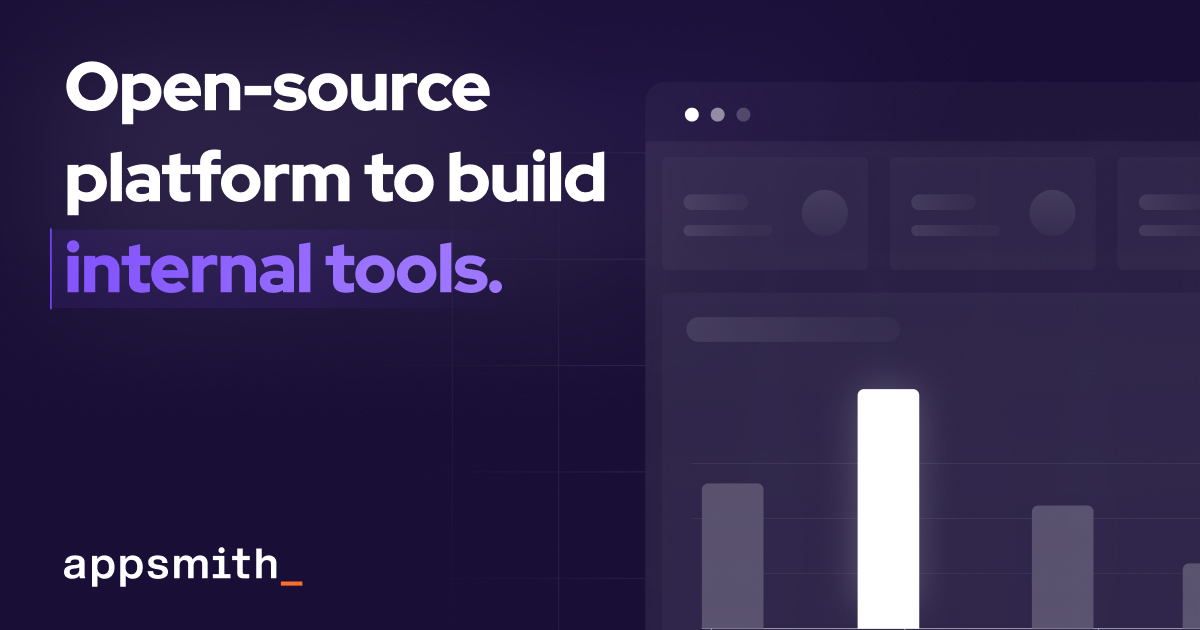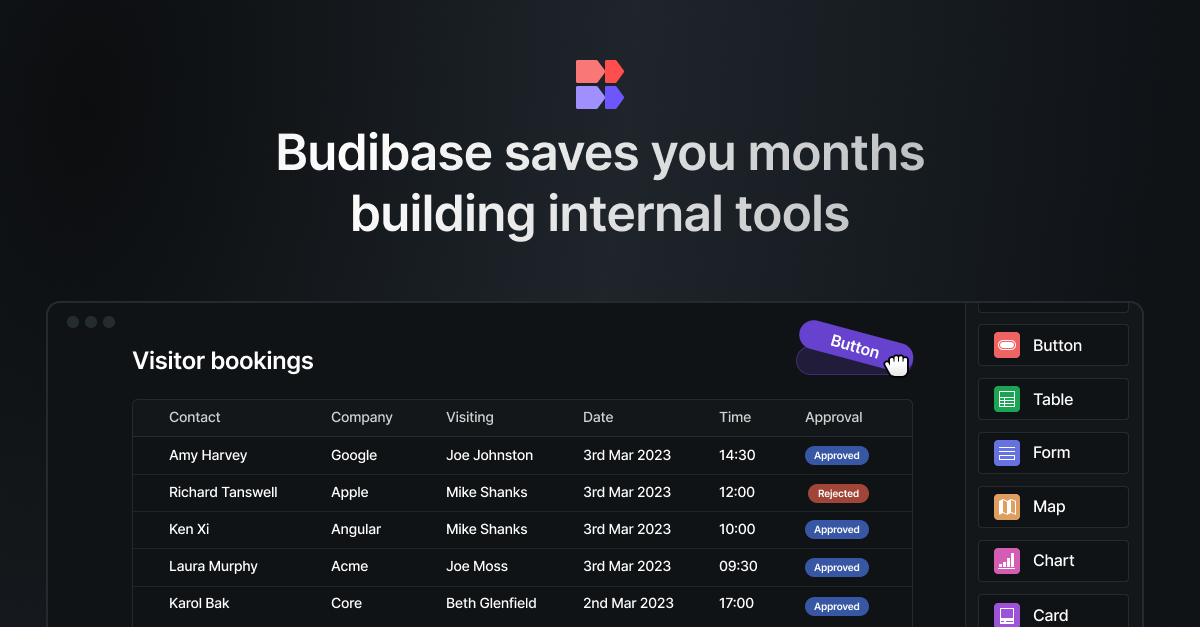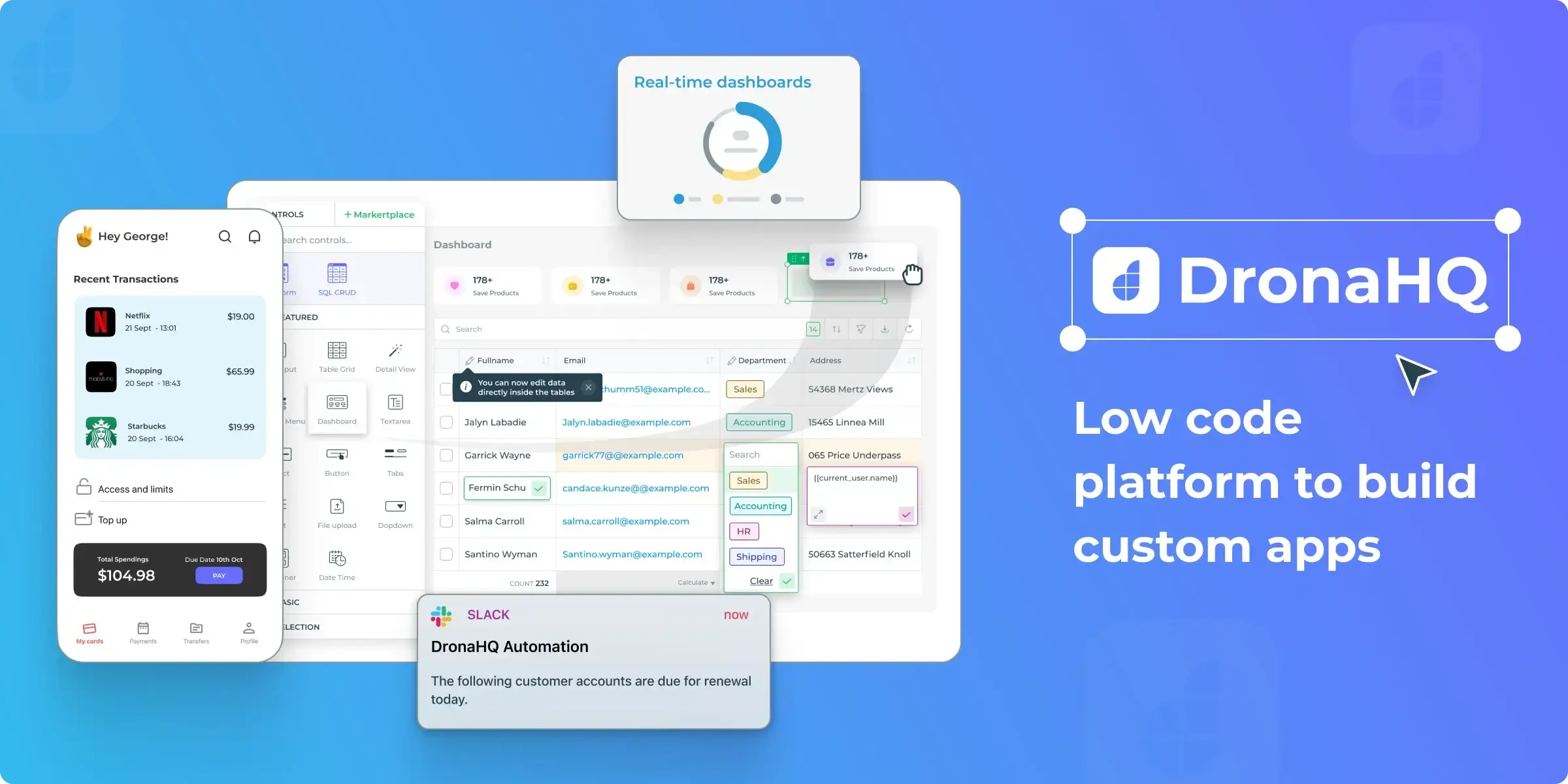Not only Gen Z, but also Millennials, and X-ers are almost without exception caught in the web, and no longer use paper mail (except for the Germans, I feel your pain, guys) – we all are counting on email. And while we can agree that we rarely write private emails, preferring to chat on iMessage, Messenger, or WhatsApp, in the business world emails still are pretty common.
One of the most widespread business email types is transactional – a form of non-duplex communication when a sender doesn’t expect an answer from the addressee. What are they in the case of the Retool Environment? Notifications, or, to be more specific, reports. In this article, we’ll focus mostly on them.
When to Send Reports
We send email reports from our Retool apps on two occasions: first is a situation when a user clicks, to say, a button in an app, while second is when a user (or a group of users) expects to get some data extracted from the system automatically on schedule.
What’s the point here? It’s unreasonable to make a user log in to Retool, navigate to an app, and then perform some actions (even if the action is limited to the button ‘Get Report’ click) if a user just wants to get an update on the current status. In this case, we built an app that manages an email list and a corresponding workflow that performs real actions on the schedule.

Choosing an Emailing Service
Note: This part might be the most important, so try to read it carefully.
If you do not expect to send more than 120 emails an hour, and they are dedicated to your internal team only, I’ve got some good news for you. Retool has a built-in email resource, that is already preconfigured to be used across apps and workflows. But Retool Email has some limitations, too. Besides the 120 emails per hour limit, which drops down to 50 emails per day for the Free plan, there are more points to think about:
- the email address from which you will receive emails looks like email@your-company.retool-email.com,
- and you always get ‘Sent via Retool Email’ signature.
If you are okay with that, no problem.

If you are not, however, you might need to make additional steps to get emails flying out. You can send them using SMTP – in this case, Retool will act as a mail client. But just to note, if you are using Google Workspace, don’t even try to connect it this way! Google will drop support for all the ‘less secure apps’ in September 2024. However, you will still be able to interact with Google API using OAuth2.

Or you can subscribe to a service like Sendgrid, or SendPulse, you name it. This is the first choice after Retool Email, in my opinion, and here’s why: in general, these services provide a templating system, that allows you to generate emails by just passing JSONs to the API endpoint.
Real-Life Example: Order Status Report
One of the clients for whom we are developing an app right now wants to be able to see some updates on Order Statuses every morning in their inbox. This report is intended to be received by the internal team, we expect not more than 31 emails a month (February will let us save even 2-3 emails, depending on the year), so we agreed to use Retool Email.

The logic behind this process is as follows:
- We get that one and only email to send the reports to from the DB table;
- We extract some data from the DB;
- Then we create a number of CSV files using JS;
- Finally, we sent an email with attachments.

As you can see on the screenshot, Retool Email supports plain text, HTML, and Markdown. For this project, we decided to use a Markdown option, because it lets us get a simple formatting without spending too much time on it.
Okay, but what about schedules? I’ve been waiting for this question! To make these reports to be generated and sent automatically, we have to configure start triggers. In this case, we do not need a Retool webhook option to be enabled, but the schedule option. There you can specify an interval on which the workflow runs, or use a CRON-style notation to define a schedule. For our task a plain ‘sent at 6 am every day’ is enough, so we stopped on the ‘Interval’ option.

One More Example to Wrap Up
I know you are already crafting your emails but wait a moment. I’ve got one more idea to share.
One of our clients wanted to secure themselves from a potential Retool outage (they use a cloud instance, to say). So we find a solution to facilitate this need using Retool Email.
Every night, a workflow runs. It gets all the project-associated table data as JSON strings and packs them into a single CSV file with two columns – table_name and table_data. Then this file is emailed to a backup address. Voila!
As you can see, email reports have dozens of potential use cases, so don’t limit yourself while working with them. And happy retooling!
---
Dmitry is the Head of Low-Code Department at Akveo. With a rich background in media and marketing, Dmitry brings an extraordinary look at the world of IT technologies. He is deeply passionate about finding the most effective and elegant solutions to complex client problems. In our blog articles, Dmitry will share his expertise in Retool and other low-code platforms to offer you valuable insights on Retool to enhance business process efficiency.
We already discusses with him how to use Retool Workflows, how to improve application security and how to schedule changes. More topics are coming. Stay tuned!
Streamlining Gifting Marketplace Operations with Retool
Afloat, a gifting marketplace, needed custom dashboards to streamline order management, delivery tracking, and reporting while integrating with Shopify and external APIs.
The solution:
We built two Retool-based dashboards:
- A Retail Partner Dashboard embedded into Shopify for managing orders and store performance.
- An Admin Dashboard for handling deliveries and partner data.
Both dashboards included real-time integration with Afloat's Backend and APIs for accurate, up-to-date data and scalability.
The result: enhanced efficiency, error-free real-time data, and scalable dashboards for high-order volumes.
Billing Automation for a SaaS Company with Low-Code
Our client needed a robust billing solution to manage hierarchical licenses, ensure compliance, and automate invoicing for streamlined operations.
The solution:
We developed a Retool-based application that supports multi-tiered licenses, automates invoicing workflows, and integrates seamlessly with CRM and accounting platforms to enhance financial data management.
The result:
- Achieved 100% adherence to licensing agreements, mitigating penalties.
- Automated invoicing and workflows reduced manual effort significantly.
- Dashboards and reports improved decision-making and operational visibility.
Retool Dashboards with HubSpot Integration
Our client needed a centralized tool to aggregate account and contact activity, improving visibility and decision-making for the sales team.
The solution
We built a Retool application integrated with HubSpot, QuickMail, and Clay.com. The app features dashboards for sorting, filtering, and detailed views of companies, contacts, and deals, along with real-time notifications and bidirectional data syncing.
The result
- MVP in 50 hours: Delivered a functional application in just 50 hours.
- Smarter decisions: Enabled data-driven insights for strategic planning.
- Streamlined operations: Reduced manual tasks with automation and real-time updates.
Lead Generation Tool to Reduce Manual Work
Our client, Afore Capital, a venture capital firm focused on pre-seed investments, aimed to automate their lead generation processes but struggled with existing out-of-the-box solutions. To tackle this challenge, they sought assistance from our team of Akveo Retool experts.
The scope of work
The client needed a tailored solution to log and track inbound deals effectively. They required an application that could facilitate the addition, viewing, and editing of company and founder information, ensuring data integrity and preventing duplicates. Additionally, Afore Capital aimed to integrate external tools like PhantomBuster and LinkedIn to streamline data collection.
The result
By developing a custom Retool application, we streamlined the lead generation process, significantly reducing manual data entry. The application enabled employees to manage inbound deals efficiently while automated workflows for email parsing, notifications, and dynamic reporting enhanced operational efficiency. This allowed Afore Capital's team to focus more on building relationships with potential founders rather than on administrative tasks.
Retool CMS Application for EdTech Startup
Our client, CutTime, a leading fine arts education management platform, needed a scalable CMS application to improve vendor product management and user experience.
The scope of work
We developed a Retool application that allows vendors to easily upload and manage product listings, handle inventory, and set shipping options. The challenge was to integrate the app with the client’s system, enabling smooth authentication and product management for program directors.
The result
Our solution streamlined product management, reducing manual work for vendors, and significantly improving operational efficiency.
Building Reconciliation Tool for e-commerce company
Our client was in need of streamlining and simplifying its monthly accounting reconciliation process – preferably automatically. But with a lack of time and low budget for a custom build, development of a comprehensive software wasn’t in the picture. After going through the case and customer’s needs, we decided to implement Retool. And that was the right choice.
The scope of work
Our team developed a custom reconciliation tool designed specifically for the needs of high-volume transaction environments. It automated the processes and provided a comprehensive dashboard for monitoring discrepancies and anomalies in real-time.
The implementation of Retool significantly reduced manual effort, as well as fostered a more efficient and time-saving reconciliation process.
Creating Retool Mobile App for a Wine Seller
A leading spirits and wine seller in Europe required the development of an internal mobile app for private client managers and administrators. The project was supposed to be done in 1,5 months. Considering urgency and the scope of work, our developers decided to use Retool for swift and effective development.
The scope of work
Our developers built a mobile application tailored to the needs of the company's sales force: with a comprehensive overview of client interactions, facilitated order processing, and enabled access to sales history and performance metrics. It was user-friendly, with real-time updates, seamlessly integrated with existing customer databases.
The result? Increase in productivity of the sales team and improved decision-making process. But most importantly, positive feedback from the customers themselves.
Developing PoC with Low Code for a Tour Operator
To efficiently gather, centralize, and manage data is a challenge for any tour operator. Our client was not an exception. The company was seeking to get an internal software that will source information from third-party APIs and automate the travel itinerary creation process. Preferably, cost- and user-friendly tool.
The scope of work
Our experts ensured the client that all the requirements could be covered by Retool. And just in 40 hours a new software was launched. The tool had a flexible and easy-to-use interface with user authentication and an access management system panel – all the company needed. At the end, Retool was considered the main tool to replace the existing system.
Testing New Generation of Lead Management Tool with Retool
Our client, a venture fund, had challenges with managing lead generation and client acquisition. As the company grew, it aimed to attract more clients and scale faster, as well as automate the processes to save time, improve efficiency and minimize human error. The idea was to craft an internal lead generation tool that will cover all the needs. We’ve agreed that Retool will be a perfect tool for this.
The scope of work
The project initially began as a proof of concept, but soon enough, with each new feature delivered, the company experienced increased engagement and value.
We developed a web tool that integrates seamlessly with Phantombuster for data extraction and LinkedIn for social outreach. Now, the company has a platform that elevates the efficiency of their lead generation activities and provides deep insights into potential client bases.
Building an Advanced Admin Portal for Streamlined Operations
Confronted with the need for more sophisticated internal tools, an owner of IP Licensing marketplace turned to Retool to utilize its administrative functions. The primary goal was to construct an advanced admin portal that could support complex, multi-layered processes efficiently.
The scope of work
Our client needed help with updating filters and tables for its internal platform. In just 30 hours we've been able to update and create about 6 pages. Following features were introduced: add complex filtering and search, delete records, styling application with custom CSS.
Together, we have increased performance on most heavy pages and fixed circular dependency issues.
Creating MVP Dashboard for Google Cloud Users
Facing the challenge of unoptimized cloud resource management, a technology firm working with Google Cloud users was looking for a solution to make its operations more efficient. The main idea of the project was to create an MVP for e-commerce shops to test some client hypotheses. Traditional cloud management tools fell short.
The scope of work
Determined to break through limitations, our team of developers turned Retool. We decided to craft an MVP Dashboard specifically for Google Cloud users. This wasn't just about bringing data into view; but about reshaping how teams interact with their cloud environment.
We designed a dashboard that turned complex cloud data into a clear, strategic asset thanks to comprehensive analytics, tailored metrics, and an intuitive interface, that Retool provides. As the results, an increase in operational efficiency, significant improvement in cost management and resource optimization.
Elevating CRM with Custom HubSpot Sales Dashboard
Our other client, a SaaS startup, that offers collaborative tools for design and engineering teams, was on a quest to supercharge their sales efforts. Traditional CRM systems were limited and not customizable enough. The company sought a solution that could tailor HubSpot to their workflow and analytics needs.
The scope of work
Charged with the task of going beyond standard CRM functions, our team turned to Retool. We wanted to redefine how sales teams interact with their CRM.
By integrating advanced analytics, custom metrics, and a user-friendly interface, our developers provided a solution that transformed data into a strategic asset.
In 40 hours, three informative dashboards were developed, containing the most sensitive data related to sales activities. These dashboards enable our customer to analyze sales and lead generation performance from a different perspective and establish the appropriate KPIs.
Building a PDF Editor with Low-Code
Our client, a leading digital credential IT startup, needed a lot of internal processes to be optimized. But the experience with low-code tools wasn’t sufficient. That’s why the company decided to hire professionals. And our team of developers joined the project.
The scope of work
The client has a program that designs and prints custom badges for customers. The badges need to be “mail-merged” with a person’s info and turned into a PDF to print. But what is the best way to do it?
Our developers decided to use Retool as a core tool. Using custom components and JavaScript, we developed a program that reduced employees' time for designing, putting the data, verifying, and printing PDF badges in one application.
As a result, the new approach significantly reduces the time required by the internal team to organize all the necessary staff for the conference, including badge creation.





















